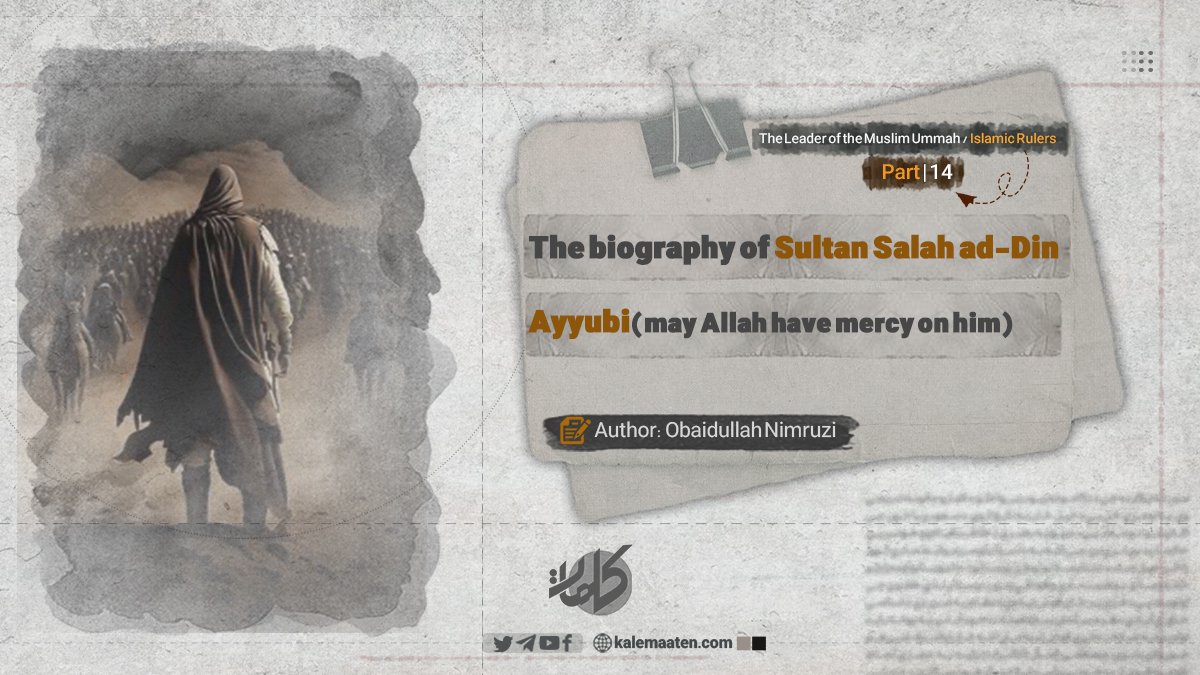
Author: Obaidullah Nimruzi
The Biography of Sultan Salah ad-Din Ayyubi ‘May Allah Have Mercy on Him’ (Part 14)
The Sultan’s Bravery and Chivalry
The Sultan’s patience and endurance were so remarkable that Qazi Ibn Shaddad noted that at one time, the Sultan’s body was covered in wounds and sores from the waist to the knees, rendering him unable to sit. The table was spread, but the Sultan could not sit to eat. Despite this discomfort, he positioned himself at the front lines of the battle. I have witnessed him riding a horse from morning until evening, moving from one end of the army to the other, organizing the army units and issuing battle orders. He endured the pain from his injuries with remarkable patience. Whenever I expressed surprise at his endurance, he would reply, “After riding a horse, I do not feel the pain.”
In one battle, despite being unwell, he relentlessly pursued the enemy. One night, the Sultan’s physician and I were attending to him, trying to keep him entertained. The Sultan alternated between sleeping and waking. As dawn broke, he mounted his horse and ordered his sons to lead the army, entrusting everyone to Allah, assigning each to their respective positions, with his physician and me by his side. The Sultan stood on his feet from morning until evening, overseeing the battle, until nightfall when he instructed the troops to remain prepared and then returned with me to his tent.
Sultan Salah ad-Din also exemplified bravery. Qazi Ibn Shaddad reported that the Sultan would patrol the enemy’s camp once or twice a day. While engaging in hand-to-hand combat alone, he would ride his horse to inspect the ranks and trenches of the army. A horse was kept ready by the trainer for the Sultan, who would pass through the ranks, instructing each unit to take suitable positions in the trenches or advance. The Sultan’s confidence in victory and his courage can be seen in the following incident: I once mentioned to the Sultan that he had shown interest in listening to hadith in various settings, but I had not witnessed him holding a hadith session during the war. I suggested that if such a session were held, it would be a blessing for us. The Sultan ordered that a hadith session be conducted between the two ranks, those of friends and foes alike.
Sultan Salah al-Din never feared the numerical superiority of the enemy during his campaigns, even when facing five to six hundred thousand adversaries. Yet, Allah Almighty granted him victory, leading to the defeat and capture of many of the enemy troops.
On one occasion, more than seventy enemy ships invaded the port of Acre, which I counted from evening until sunset, yet the Sultan remained unbothered. During the significant battle of Acre, while positioned in the midst of the Muslim forces, the enemy ships anchored, and their army penetrated deep into the heart of the Muslim lines, causing the Muslim flags and slogans to fall. However, the Sultan, along with a few of his companions, remained steadfast, taking up a position against the mountains, fortifying their stance. They rallied all the fleeing soldiers, urging them to resume the battle. As a result of this action, the retreating soldiers returned to the fray and attacked the enemy, ultimately killing seventy thousand of them, leading the Muslims to victory. Regarding the Sultan’s remarkable determination and steadfastness, Qazi Ibn Shaddad remarks: “One day, the Sultan said, ‘I will share my heartfelt decision with you. I have resolved that after clearing the coast of the Crusaders, I will divide the land, provide necessary instructions, and then travel by sea to the islands of Europe, pursuing the Westerners to their last stronghold, leaving not a single infidel upon the earth, or I will die in this endeavor.'”
Knowledge and Virtues
Sultan Salah al-Din was also an outstanding scholar in various fields of knowledge. He was not only well-versed in the genealogy of Arab tribes but also memorized the lineage of famous horses. He possessed a thorough understanding of the history and notable events of the Arabs and was knowledgeable about the wonders and marvels of the world. The Sultan’s close friends and companions greatly benefited from his extensive knowledge. Some historians have noted, “The Sultan memorized great epics.”
Lin Poole wrote about the early life of Sultan Salah al-Din, noting that his main inclination was toward religious works. He listened to hadith from the scholars of his time and rigorously examined the evidence and chains of their narrators. He engaged in discussions over jurisprudential issues and had a profound interest in interpreting the verses of the Quran, with a primary concern for affirming and confirming the position of the Ahl al-Sunnah wa al-Jama’aا with strong evidence.
Continues…


